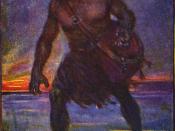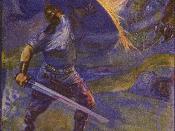Heroism today is not the same as the Anglo-Saxon times. The definition of the word "hero"ÃÂ today is completely different from then. Heroes today thrive for different aims compared to then. Also whether today's heroes have selflessness like Beowulf. During the Anglo-Saxon times, heroes like Beowulf proves their deeds in wars and battles, but today, heroes are celebrities, like movie stars and singers, who prove their deeds in public appearances.
Definition of a hero during the Anglo-Saxon period is a person who has done great achievements for his people in wars and battles. Beowulf is the hero that is compared to "That mighty protector of man"æ."ÃÂ, and today's celebrities are compared like gods or goddesses. Today's definition of a hero is a famous person who is admired and a role-model to some, so today's heroes are actually very different compared to Anglo-Saxon's.
Heroes now and then all thrived for many, similar and different, purposes.
Though all heroes end up with fame and glory as their final reward, their starting points were different. Even though, Beowulf fought Grendel and in return he received money and fame, but no one would risk their life for materiality. His true intentions were actually to liberate the Danes from the wrath of Grendel. Despite the fact that, when Beowulf speaks of his former deeds like the battle with sea monsters and giants, he enjoys the attention and admiration he receives, like all modern day celebrities. Today's celebrity "heroes"ÃÂ become famous mainly because of the prestige one will receive, and partly for the love of their music, act, etc. Even parents dreamed of their child(ren) to be famous one day by sending them to piano, ballet, acting, and singing lessons.
Today's heroes do not have selflessness like Beowulf. Many of Beowulf's actions indicate...


